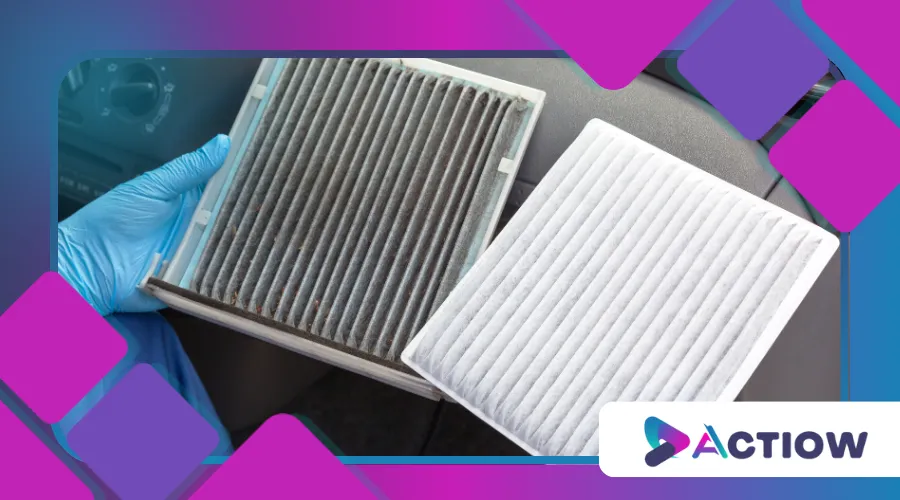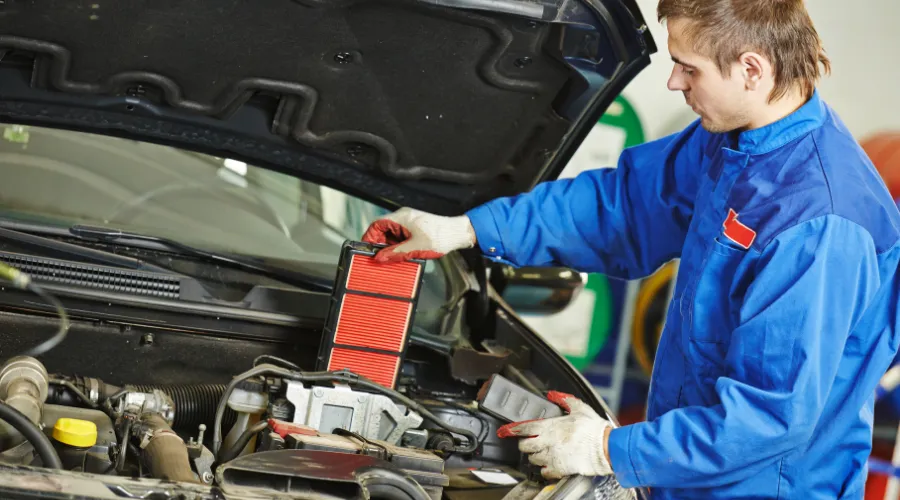Why You Should Check Your Cabin Air Filter More Often in 2025

Anúncios
In 2025, the call to check your cabin air filter more often isn’t just routine advice—it’s a critical step toward healthier driving.
As vehicles evolve with cutting-edge tech like advanced driver-assistance systems and electrified powertrains, the humble cabin air filter remains a silent workhorse, protecting you from pollutants, allergens, and urban smog.
Yet, many drivers treat it as an afterthought, risking their well-being and vehicle performance.
Anúncios
With air quality concerns rising and driving habits shifting, 2025 demands a fresh look at this overlooked component.
This article explores why inspecting your filter regularly is a non-negotiable habit, offering compelling reasons backed by data, real-world scenarios, and practical tips.
The Invisible Threat Lurking in Your Car’s Air Quality
Picture this: you’re cruising through a bustling city, windows up, air conditioning humming.
You assume you’re shielded from the exhaust fumes and dust swirling outside.
But without a clean cabin air filter, your vehicle’s ventilation system could be funneling those same irritants straight into your lungs.
Cabin air filters trap pollen, dust, mold spores, and even harmful gases like nitrogen dioxide.
When clogged, they lose efficiency, forcing your HVAC system to work harder and letting contaminants slip through.
A 2025 report from the American Lung Association (ALA) underscores the urgency: 40% of Americans live in areas with unhealthy air quality, with urban centers like Los Angeles and Phoenix seeing spikes in particulate matter (PM2.5).
A neglected filter exacerbates exposure to these risks, especially for those with asthma or allergies.
Checking your cabin air filter more often ensures you’re not silently inhaling what you’re trying to escape.
Moreover, the importance of clean air extends beyond personal health.
Studies show that improved air quality in vehicles can enhance driver focus and reduce fatigue, contributing to safer driving conditions overall.
Example: The Allergy Ambush
Meet Emma, a Phoenix-based rideshare driver who noticed her seasonal allergies worsening during shifts.
Sneezing and watery eyes plagued her rides, reducing her focus.
A mechanic revealed her cabin air filter was caked with dust and pollen, turning her car into an allergy hotspot.
After replacing it, Emma’s symptoms eased, and her passengers raved about fresher air.
Regular checks now keep her car a sanctuary.
This scenario highlights how a simple maintenance task can significantly improve not just comfort but also overall well-being.
Emma’s experience serves as a reminder that proactive care can lead to a better quality of life on the road.
+ How to Reduce Brake Dust in High-Traffic Urban Areas
The Ripple Effect on Vehicle Efficiency
Beyond health, a clogged cabin air filter drags down your car’s performance.
When airflow is restricted, the HVAC system strains, consuming more energy—whether it’s gas in a traditional engine or battery in an EV.
For 2025’s hybrid and electric models, like the Toyota Corolla Hybrid or Tesla Model Y, this inefficiency can dent fuel economy or range, hitting your wallet and eco-credentials.
Consider this stat: A 2023 study by the Department of Energy found that HVAC inefficiencies, including clogged filters, can reduce EV range by up to 5% in extreme conditions.
For a 300-mile-range EV, that’s 15 miles lost—enough to make you sweat on a long commute.
Check your cabin air filter more often to keep your vehicle running optimally and avoid unexpected costs.
Additionally, maintaining a clean cabin air filter can lead to less frequent repairs and longer vehicle lifespan, making it a wise investment for any driver.
As the automotive landscape continues to evolve, efficiency will remain a key focus for both manufacturers and consumers.
| Condition | Effect on HVAC | Impact on Efficiency |
|---|---|---|
| Clean Filter | Optimal airflow, low energy use | Full range/fuel economy preserved |
| Moderately Clogged | Reduced airflow, increased strain | 2-3% efficiency loss |
| Severely Clogged | Restricted airflow, system overwork | 5%+ efficiency loss, potential damage |

The 2025 Context: Why Now Matters
Driving patterns are shifting.
Remote work has given way to hybrid schedules, with Americans logging more short trips and urban commutes.
These stop-and-go drives expose filters to more pollutants than long highway stretches.
Add in 2025’s climate challenges—wildfires, heatwaves, and pollen surges—and filters face a tougher gauntlet.
Ever wonder why your car smells musty after a rainy week?
A saturated filter can breed mold, turning your cabin into a petri dish.
Checking your cabin air filter more often catches these issues early, sparing you from costly repairs or health headaches.
The increasing frequency of extreme weather events also underscores the need for regular maintenance.
As environmental conditions fluctuate, ensuring clean air inside your vehicle becomes even more critical.
Analogy: Your Car’s Lungs
Think of your cabin air filter as your car’s lungs.
Just as you’d struggle to breathe through a dusty mask, your vehicle chokes when its filter is clogged.
Regular checks keep those “lungs” clear, ensuring every drive is smooth and safe.
This analogy emphasizes the interconnectedness of vehicle maintenance and personal health.
By caring for your cabin air filter, you’re not just enhancing your car’s performance; you’re also protecting your health and well-being.
Busting Myths About Cabin Air Filter Maintenance
Misconceptions abound.
Some drivers believe filters only need attention during annual services.
Others assume “premium” filters last forever.
Wrong.
Even high-end filters, like those with activated carbon, degrade under heavy use.
Urban drivers or those in dusty regions—like Texas or Nevada—may need checks every 6,000 miles, not the 15,000-mile intervals often cited in manuals.
Another myth: “I don’t use AC, so my filter’s fine.”
Wrong again.
Your ventilation system pulls air even with the AC off, exposing the filter to debris.
Check your cabin air filter more often to sidestep these traps and tailor maintenance to your driving reality.
Moreover, being informed about the correct maintenance intervals empowers drivers to take better care of their vehicles.
Educating yourself on these myths can lead to improved vehicle performance and safety.
| Driving Environment | Check Interval | Replacement Interval |
|---|---|---|
| Urban/High Pollution | Every 6,000 miles | Every 12,000 miles |
| Suburban/Moderate Dust | Every 9,000 miles | Every 15,000 miles |
| Rural/Low Pollution | Every 12,000 miles | Every 20,000 miles |
++ Motorcycle Chain Maintenance in the Age of High-Torque Electric Bikes
Practical Tips for Staying Ahead
Maintaining your filter doesn’t require a mechanic’s degree.
Most filters are behind the glovebox, accessible in minutes.
Check your owner’s manual for specifics, but here’s a quick guide:
- Inspect Monthly: Pop open the filter housing and look for dirt or debris. If it’s gray or clogged, replace it.
- Choose Wisely: Opt for filters matching your needs—standard for rural drivers, carbon for city dwellers.
- Track Mileage: Use a mileage app to remind you when to check.
- DIY or Pro: Replacing a filter is a $20, 10-minute job. If unsure, a shop can handle it during an oil change.
Checking your cabin air filter more often saves time and money while boosting comfort.
Why risk a musty cabin or strained system when prevention is so simple?
Additionally, creating a maintenance schedule can streamline the process and ensure you never forget to check your filter.
This proactive approach can save you from unexpected inconveniences on the road.

Example: The Road Trip Revelation
Jake, a Seattle-based freelancer, planned a 2025 road trip through California’s wildfire-prone regions.
Midway, his car’s AC weakened, and a smoky odor crept in.
A roadside check revealed a filter choked with ash and debris.
Swapping it out restored airflow and banished the smell, saving his trip.
Now, Jake checks his filter before every long drive, a habit born from that near-miss.
This experience highlights the importance of regular maintenance, especially before significant trips.
By making filter checks a routine part of his preparation, Jake ensures a more enjoyable and safe journey.
The Bigger Picture: Health, Comfort, and Value
Your car is more than transport—it’s a sanctuary.
A clean cabin air filter elevates every drive, from daily commutes to cross-country adventures.
It’s a small investment with outsized returns: better health, sharper focus, and a vehicle that performs as promised.
In 2025, with air quality challenges and evolving tech, neglecting this component is a gamble you can’t afford.
Ask yourself: Why settle for stuffy air or sluggish performance when a quick check can transform your ride?
Check your cabin air filter more often to reclaim control over your driving experience.
Furthermore, understanding the long-term benefits of maintaining your cabin air filter can lead to a more enjoyable driving experience overall.
Healthy air quality contributes to better mood and concentration, enhancing your time behind the wheel.
For more information on maintaining your vehicle’s air quality, check out Consumer Reports.
Looking Ahead: The Future of Cabin Air Filters
Innovation is reshaping filters.
In 2025, brands like Bosch and Mann-Filter are rolling out “smart” filters with sensors that alert drivers to clogs via smartphone apps.
Some luxury models, like the 2025 BMW iX, integrate advanced filtration systems rivaling home air purifiers.
These trends underscore the growing importance of cabin air quality, making regular checks even more critical as tech raises the bar.
Yet, no matter how advanced filters become, they still need human vigilance.
Checking your cabin air filter more often ensures you’re maximizing these innovations, not squandering them.
Additionally, as technology continues to advance, we can expect even more sophisticated solutions for maintaining air quality in vehicles.
This ongoing evolution will likely lead to even more effective filters and monitoring systems in the future.
Wrapping Up: A Small Habit, A Big Impact
In 2025, checking your cabin air filter more often isn’t just maintenance—it’s a commitment to health, efficiency, and comfort.
From dodging urban pollutants to preserving your EV’s range, this simple habit pays dividends.
With air quality worsening and driving demands shifting, there’s no better time to act.
Grab a flashlight, pop open that glovebox, and make filter checks a ritual.
Your lungs—and your car—will thank you.
